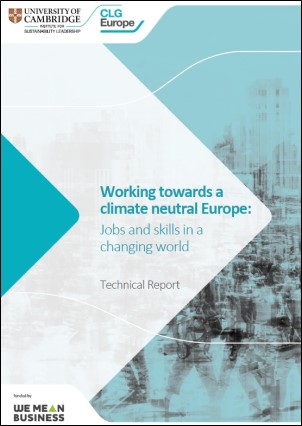28 April 2020 – This technical report from CLG Europe delivered by Cambridge Econometrics (CE) includes research findings that underpin 'Working towards a climate neutral Europe: Jobs and skills in a changing world'. The publication explores the labour market impacts of the transition to a climate neutral Europe in the context of four key megatrends. It investigates how climate action interacts with these trends, how climate policies can provide direction on the future shape of the economy, and how the other megatrends may either facilitate or impede progress towards climate neutrality.

About
This technical report sets out an analysis of the long-term factors affecting jobs and skills in Europe and examines how a proactive policy response to the climate crisis can affect that future. The bulk of the research was completed in early March 2020 – before the impact of recent events became apparent.
Delivering the Green Deal will require an unprecedented degree of cooperation and collaborative effort involving industry, research and government. Reducing greenhouse gas (GHG) emissions by 50–55 per cent by 2030 and to net zero by 2050 will require substantial changes across the economy. Since the announcement of the Green Deal, the EU is now responding to the Covid-19 emergency and beginning to lay plans for the post-Covid-19 recovery package. Experience from the 2009 global financial crisis, and in the context of the European focus on achieving climate goals, means that this could include major stimulus packages and potentially the immediate ramping up of green investments – in renewables, efficiency retrofits of homes, public transport and connected demand response mechanisms.
Beyond the enormous impact of current events, this report addresses the fact that the policy-driven transition to a climate neutral Europe will need to take place within a context that is influenced by additional socio-economic–environmental dynamics taking place worldwide, known as megatrends.
Specifically, the report assesses:
- Technological change (artificial intelligence (AI), big data, digitalisation),
- Demographic change,
- Globalisation
- Resource scarcity
This report is divided into two main sections. The first section describes the four megatrends and their implications for jobs and skills in Europe. In the second part of the report, these megatrends are contextualised with a set of case studies that focus on specific sectors of the economy that need to transition for Europe to achieve climate neutrality by 2050. Each sectoral case study is located in a specific country to allow us to explore the impact of national/regional policy on the jobs and skills in relation to this sector. It also includes several business case studies highlighting how businesses are dealing with different megatrends. Subsequently, a concluding section offers some high-level policy insights based on the main content of the report.
Citing the briefing
Please cite this report as: University of Cambridge Institute for Sustainability Leadership (CISL). (2020). Working towards a climate neutral Europe: Jobs and skills in a changing world. Technical Report. Cambridge, UK: CLG Europe.
Access the full report, case studies and policy recommendations here.
Find out more about CLG Europe.




